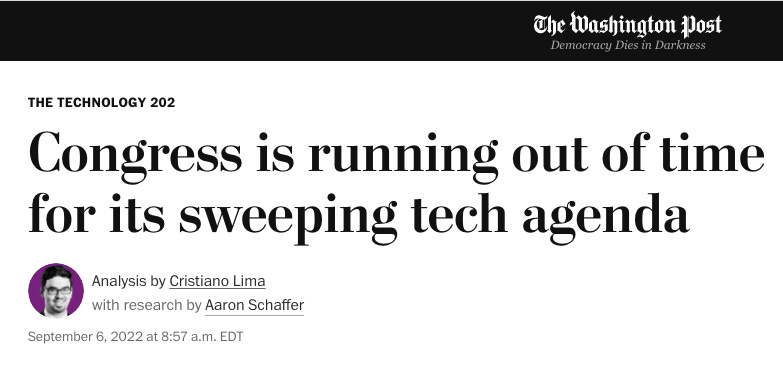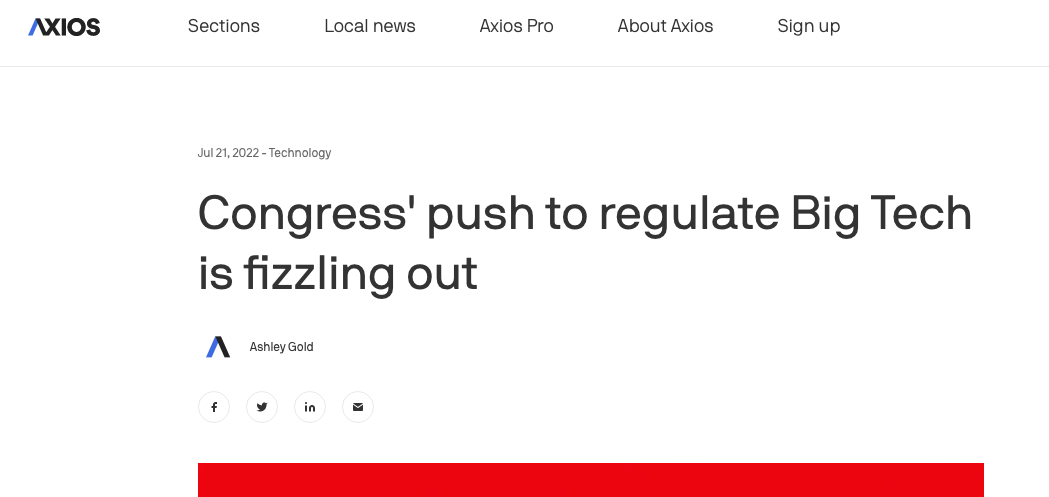Congress to Vote on New Antitrust Laws This Week
A key set of bills on antitrust and China policy will be moving in the House of Representatives. They haven't gotten much attention, but they matter.
Welcome to BIG, a newsletter on the politics of monopoly power. If you’re already signed up, great! If you’d like to sign up and receive issues over email, you can do so here.
Today I’m going to talk about an important event this week, most notably a likely Congressional vote to change antitrust law.
Plus:
The Department of Agriculture issued new pro-farmer antitrust rules on deception and retaliation.
Some good news on judges for a change.
And now…

Over the last four years, there’s been a lot of discussion over how to address the power of big tech. The most prominent bill proposed is the American Innovation and Choice Online Act, which passed both the House and the Senate Judiciary Committees last year. The proponents of that bill argue that it bans self-preferencing by dominant tech firms of their own products, like Amazon pushing its own Amazon Basics line ahead of merchants. It got a lot of attention, the focus of one segment on John Oliver’s Last Week Tonight, as well as ample write-ups in most major newspapers. There are other bills, like the Open App Markets Act, which addresses control of app stores by Google and Apple, as well as the Journalism and Competition Protection Act to redress bargaining power imbalances between Google and newspapers, a bill I described a few weeks ago.
But so far all this legislation put forward, while most of it has passed various Congressional committees, has been held up by Senator Chuck Schumer, and a weird mix of libertarian Republicans and Silicon Valley Dems. None of it will pass before the election, though some may move during the window of lawmaking that happens after midterms but before the new Congress is seated, known as the ‘lame duck’ session. This dynamic has led to the standard pessimistic narrative from reporters and policy elites.
For example, here is the Jeff Bezos-owned Washington Post:
And here’s Axios, whose conflicted business model is to break important news, but also to support its essential journalism via ad money from big tech firms. (“Facebook is a massive net plus for us,” Axios CEO Jim VandeHei said in 2020, when he was explaining why his company’s ad business was growing ahead of plan.”)
I don’t think there’s bad faith here, as pessimism is not an unreasonable point of view. After all, while Schumer, who controls the Senate schedule, promised that big tech bills would get a vote in early summer, he was lying and refused to bring them up for a vote. So now we know most of the big tech legislation is not going to move until after the election, if at all. Basically, a combination of Google trade groups like Netchoice, left-wing advocacy groups like Free Press, establishment Republicans, and California Democrats are working overtime to block any meaningful constraints on big tech, and we are still building but have not completed the political coalition to defeat them.
However, there is some interesting news, in the form of significant antitrust legislation that could pass the House of Representatives this week, titled the “State Antitrust Enforcement Venue Act.” The venue bill, as people call it on Capitol Hill, already passed the Senate unanimously in June. It was put forward by Senator Mike Lee, the conservative who is the top Republican ranking member of the Antitrust subcommittee, and it is supported by a host of Democrats and most state attorneys general. In other words, it has broad consensus. Progressives are supportive, but here’s conservative Republican Ken Buck making the case to the right.
This bill, if it passes, would be the first strengthening of antitrust law in decades, and would make it much easier for states to bring complaints against dominant firms.
So why haven’t you heard anything about it? Partly it’s because the pessimism narrative is more natural to reporters and advocates. But a more important reason is that the venue bill is about procedure, and while procedure sounds super-boring, in litigation, procedure is often what matters.
First, let’s talk about what the bill does. Here’s my write-up from June.
Right now, when Federal enforcers bring antitrust cases, those cases are heard in the districts in which they are filed. But when state attorneys general do so, their cases can get moved around via something called the Judicial Panel on Multidistrict Litigation. This process results in state-level antitrust cases, like the Texas or Colorado ones against Google and Facebook (or pharmaceutical firms), to be moved to a different court in a different part of the country. They are often combined with private lawsuits. So state AGs don’t bring cases, because it means their ability to prosecute is slowed down dramatically, and dominant firms often get to move cases to a monopoly friendly court that is far away from the state in which the case was originally filed.
The bill changes this dynamic. State attorneys general will be able to file antitrust cases and keep them in their home district. There are a lot of implications on the importance of this procedural change, but primarily what it will mean is that enforcement is going to happen not only at the Federal level, but much more often at the state level. And that’s key, because administrations and administrative priorities on a Federal level change, so having other avenues to use antitrust law creates the kind of long-term shift we need.
This bill originates in part from the frustration of Attorney General Ken Paxton of Texas, who filed an antitrust case against Google’s domination of the online advertising industry, but then had that case removed to the Southern District of New York and combined with a set of other similar antitrust cases. This move slowed down the litigation, and has set it up for potentially being dismissed by a corporatist judge, Kevin Castel, on obscure procedural grounds involving the states taking too much time to bring the case. (Sorry for the details, but that’s where the law really lives.)
Nearly every state attorney general endorsed this change to the antitrust law, and the bill passed in a relatively uncontroversial manner through both House and Senate Judiciary committees. There was one point of dispute, which is whether the venue bill should apply retroactively, aka whether the Texas Google suit should be moved back to where it was originally filed. Silicon Valley-friendly Democrats like Alex Padilla, Zoe Lofgren and Eric Swalwell pushed back, as did Republicans like Jim Jordan, but there was also merit in saying retroactivity was problematic for procedural and Constitutional reasons. So Lee dropped that portion.
The House has issued a notice that it will vote on this bill, along with two other anti-monopoly measures, later in the week. These other two provisions also matter. One will give the Antitrust Division, though not the Federal Trade Commission, a funding boost via merger filing fee increases. This will address a serious problem; the budget crunch at the Antitrust Division is so severe they may have to pick between an antitrust suit against Google vs one against Apple, because they may not be able to afford both. The second, written by Senator Tom Cotton, will require that firms engaged in mergers must disclose subsidies from the Chinese government.
Will this legislation pass? It’s not clear. There will be hostility from the usual suspects like Lofgren, Swalwell and Jordan. Google is in Lofgren’s district, and she’s going to fight extremely hard, even threatening to ‘take down the rule,’ which means she’ll challenge on a temporary basis Nancy Pelosi’s control of the House. Meanwhile, Jordan and the right are trying to portray the bill as giving funding to Lina Khan at the Federal Trade Commission, whom they have successfully demonized. The bill wouldn’t actually appropriate money for the FTC, but good faith has never been a hallmark of these debates.
If the legislation passes the House, for procedural reasons it can’t be signed into law immediately. Congress will need to do a bit of legislative maneuvering to get it to the President’s desk. At that point, it’s not impossible for the legislation to be stopped, but it would be difficult. And if this does get through, then it will officially start the chipping away of the Chicago School dominance of antitrust through statutory changes, and it will begin to roll back Chinese influence over American corporations. If it doesn’t, then there’s more work to do on the politics.
Signs of Life at the Department of Agriculture?
When Joe Biden appointed his friend and former Iowa Governor Tom Vilsack to be the Secretary of Agriculture, a lot of anti-monopolists quietly seethed. This was his second time at the USDA, since he had also run the department under Obama, a time when he did not, to say the least, fight against consolidation. In many ways, the bureaucracy at the USDA is still deeply hostile to anti-monopoly arguments. For instance, their top sugar economist Barbara Fesco just sabotaged a merger case from the Antitrust Division.
But in other ways, Vilsack has sort of begun turning around the USDA. Today, the Ag Department announced two new modest initiatives. The first is to offer $15 million to state attorneys general to address agricultural consolidation. While that amount of money won’t change everything, most state AG offices have one or two lawyers working on antitrust and competition. So even a little money goes a long way.
In addition, the USDA has put forward new rules under a special antitrust law for agriculture, known as the Packers and Stockyards Act. These rules bar packers from discriminating against livestock and poultry growers, retaliating against them, or deceiving them. The rules will be finalized in the next four to six months, and then farmers can use them in court. The Packers and Stockyards Act is a dusty law that isn’t used much, but it is potentially very powerful. So we’ll see how this change goes.
Why is Vilsack changing his tune on concentration? It’s not that he is an anti-monopolist, but that he is largely a political creature, and understands that concentration is now a potent policy area. In some ways, how USDA is changing is a perfect experiment on how much intellectual change matters. We literally have the same guy running the same department under two different administrations. The signs of change at the USDA aren’t perfect, but at least there are signs.
Good Judgment
Over the years, I’ve made a lot out of bad judging on antitrust, because judges, whether Democratic or Republicans, have for the last forty years warped the laws designed to constrain corporate power. There’s a bit of tentative good news on this front. Judge Florence Pan, who oversaw the Simon & Schuster-Penguin merger, was just elevated to the important Court of Appeals for the District of Columbia Circuit.
Pan hasn’t decided on the book publisher merger yet, but she has already weighed in on important procedural and legal issues. She’s ruled that the parties can’t argue that an unlawful merger is otherwise legal if they can show that it reduces costs or enhances efficiency, and she’s generally been friendly to the notion that antitrust law applies to buyers of labor - aka the publishers buying books from authors - as well as the more traditional product markets involving consumer prices. These choices are the signs of someone who takes consolidated power and antitrust seriously.
We’ll see how Pan rules on the merger itself, but I suspect she’ll be better than most in her new position. And she’s now going to sit on the appeals court that’ll hear a challenge to the UnitedHealth-Change merger, if the Antitrust Division chooses to appeal it.
Thanks for reading!
And please send me tips on weird monopolies, stories I’ve missed, or comments by clicking on the title of this newsletter. And if you liked this issue of BIG, you can sign up here for more issues, a newsletter on how to restore fair commerce, innovation and democracy. And consider becoming a paying subscriber to support this work, or if you are a paying subscriber, giving a gift subscription to a friend, colleague, or family member.
cheers,
Matt Stoller






Matthew:
Please don't be "sorry for the details". To get the condensed insight you offer here I would have to invest my life and money in the pursuit of articles, reports and periodicals I have no trust or interest in. Lift the veil.
It may not be unusual legislative procedure but my anger immediately flared at Schumer and the stalling of the Antitrust Bill's in the face of the coming election. Machinations by elected political leadership, Google, Chinese influence over American Corporation's, the who, what and why of political appointees all exist in some other dimension for most Americans. Likewise the insertion of an implied "big brother" surveillance capitalist threat into almost all media as a "cooler" on discussion and inquiry. In the broad picture it obfuscates and distorts the national dialogue we deserve and creates a sense of numbing hopeless powerless "what does it matter anyway" in the American psyche.
The ongoing Corporate seizure and control of American agriculture is horror on the hoof. The IMF/WEF/CCP assault on Dutch farmers, the recent object lesson, swat style raid and shut down on an independent Amish farmer and reports that WEF poster boy Bill Gates now owns half of all productive American farmland should be THE wake up call. Efforts by financiers to capture control of the worlds water supply (we own the clouds in the sky) is completely ignored.
Manipulated crisis to crisis no solutions allowed. Americans deserve competent political leadership capable of creating a civil and prosperous future not a cabal of mercenary jackals in the service of totalitarian finance.
Hey, Matt
If you ever have time for a deep dive into Cox Automotive to how they manipulate prices for banks, dealers, and consumers it would be appreciated.
Thanks, and have a blessed day.